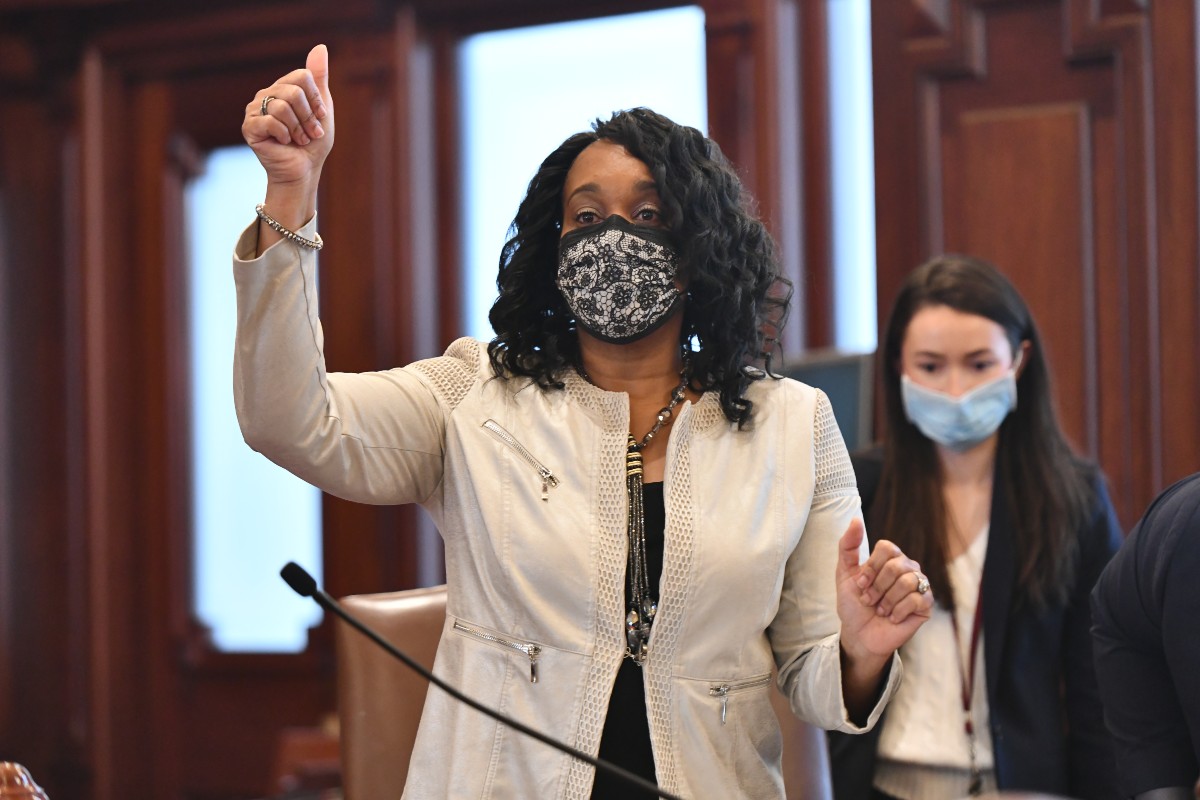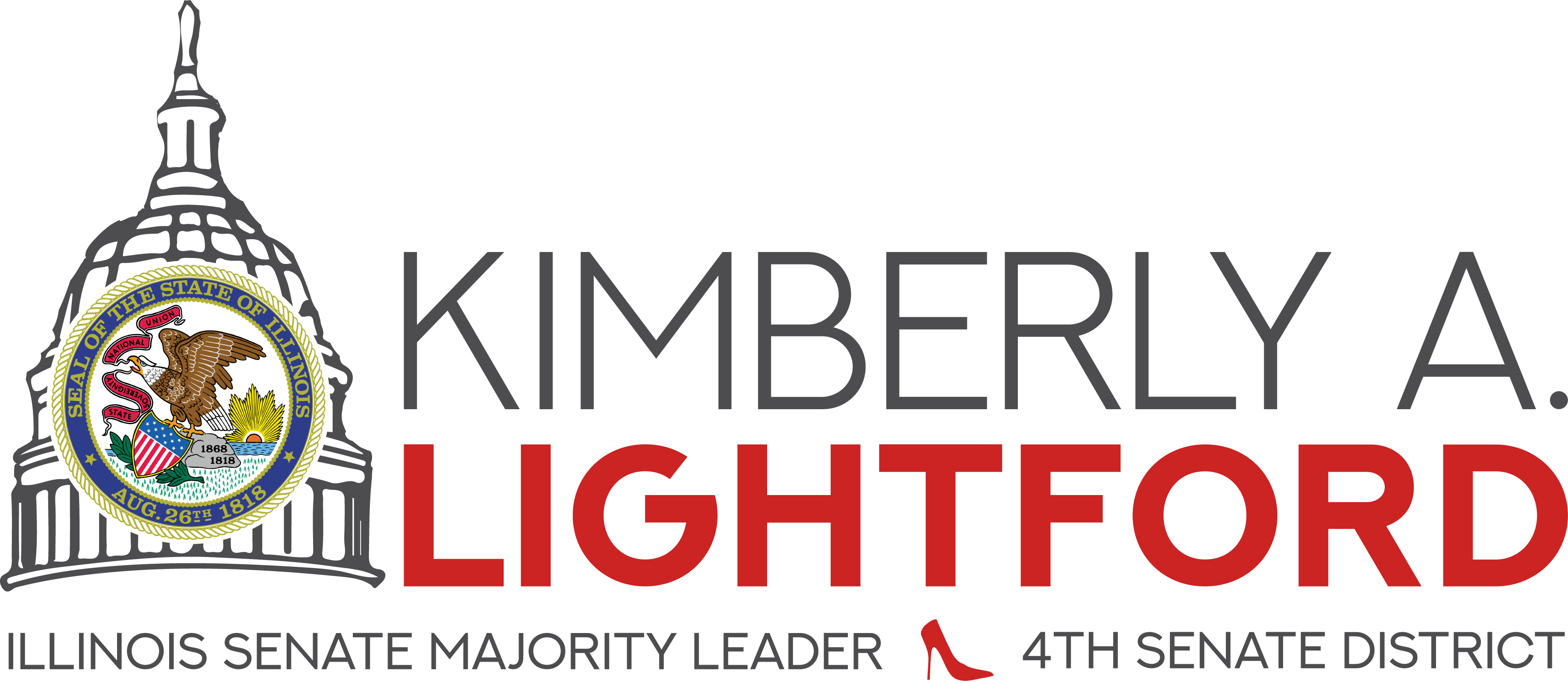 SPRINGFIELD – Black children across Illinois are a step closer to being ensured a quality education under a plan led by Senate Majority Leader Kimberly A. Lightford (D-Maywood) that passed the Illinois Senate today. The legislation is part of the Illinois Legislative Black Caucus’ plan to rid Illinois of systemic racism.
SPRINGFIELD – Black children across Illinois are a step closer to being ensured a quality education under a plan led by Senate Majority Leader Kimberly A. Lightford (D-Maywood) that passed the Illinois Senate today. The legislation is part of the Illinois Legislative Black Caucus’ plan to rid Illinois of systemic racism.The measure addresses education and workforce development from early childhood to adulthood. To help ensure school readiness, it strengthens early intervention services and sets a kindergarten readiness assessment in statute. Early intervention services, which help support the development of children with delays and disabilities, will now be available until the beginning of the school year after the child turns 3.
Rooted in equity, House Bill 2170 pivots away from teaching history from a Eurocentric perspective by reforming the state’s history curriculum through an Inclusive American History Commission that will make sure students learn about people from all backgrounds.
“For so long, we’ve taught American history in a way that ignores the contributions made by Black, Latino and LGBTQ people, and many others,” Lightford said. “We also ignore the horrible and inhumane way Black people were treated during slavery and how that history of mistreatment carries on today.”
In order to address racial justice practices and disproportionate number of Black youth suffering from trauma, the legislation creates the Whole Child Task Force. This body will be charged with creating equitable, safe, inclusive, and supportive environments for all children – but especially survivors of trauma. Creating trauma-responsive schools will help these children succeed and change the direction of their whole lives.
Recognizing the benefit all students receive by learning from Black teachers and other teachers of color, the legislation also removes some of the barriers that prevent Black people and other people of color from becoming teachers.
To help students prepare for higher education, the measure takes concrete steps to ensure Black and other marginalized students have the same opportunities to get into competitive colleges and universities as white students. It requires two years of laboratory science and foreign language (or sign language) to graduate high school. Many prestigious colleges and universities – including the state’s flagship University of Illinois – require foreign language for incoming students. To address a similar inequity, the measure also requires all high school students to take at least one course with an intense focus on computer literacy, helping young adults of every background succeed in higher education. High schools must offer at least one elective computer science class, as well.
“Our children should be graduating high school prepared to be productive adults, and that starts with what we require them to learn,” Lightford said. “It’s baffling that there are Illinois schools that don’t offer foreign language when it’s a requirement to get into our state’s flagship school.”
At the state’s public community colleges and universities, the measure supports finding more race-conscious and equitable ways to fund higher education and lower-income students. To support post-college adults, it explores the possibility of combining all of Illinois’ scattered workforce development initiatives and programs under a single agency.
The proposal now goes to the House for final consideration before heading to the governor. It is part of a package of four bills taking aim at dismantling racism, which also addresses criminal justice reform, economic access and opportunity, and health care and human services.
More information about the legislation below:
House Bill 2170 Fact Sheet
Sponsor: Majority Leader Kimberly A. Lightford (D-Maywood)
Early Childhood
- Article 10 - Allows children to continue to access Early Intervention services until the beginning of the school year after they turn 3.
- Article 5 - Codifies the Kindergarten Readiness Assessment.
- Article 40 - Requires the Department of Healthcare and Family Services to make recommendations on how to create a diagnostic system that would allow Medicaid to pay for some Early Intervention services.
- Article 15 - Expresses support for the recommendations of the Illinois Commission on Equitable Early Childhood Education and Care Funding.
- Article 35 - Urges the state to increase the availability of Infant/Early Childhood Mental Health Consultations.
K-12 Education
- Article 50 - Requires two years of laboratory science and a foreign language (or sign language) to graduate high school.
- Article 60 - Adds a one-year course with an intensive computer literacy focus to the required high school curriculum. High schools must also offer at least one elective computer science course.
- Article 65 - Requires schools to automatically enroll students in the next level of advanced coursework if they meet or exceed state standards in that subject matter – including Advanced Placement courses.
- Article 135 - Creates an Inclusive American History Commission to reform the Black history curriculum and curriculums for teaching about other minority groups.
- Article 25 - Creates a Whole Child Task Force to address trauma in children and create an equitable, inclusive, safe, and supportive environment for all children.
- Article 75 - Creates grant-funded Freedom Schools to expand teaching of Black history, the civil rights movement, civic engagement, and leadership.
Higher Education
- Article 100 - Creates English and math placement requirements at community colleges.
- Article 125 - Changes the matching requirement for AIM High scholarships. Allows schools with more than 49% Pell Grant recipients averaged over three years to pay a 20% match, while schools with less must pay a 60% match.
- Article 95 - Supports the Illinois Board of Higher Education’s efforts to identify more race conscious and equitable ways to fund higher education.
School Funding
- Article 85 - Requires the Professional Review Panel to review adequacy target calculations, racial equity, and whether the funding goals are sufficient.
Teacher Training
- Article 120 - Expands and reprioritizes distribution of Minority Teacher of Illinois Scholarships.
- Article 115 - Removes the GPA requirement for Alternative Educator Licensure.
- Article 45 - Urges the Department of Human Services to increase access to supports for teacher credential and degree attainment, with a focus to reducing barriers and increasing minority teacher representation.
- Article 155 - Establishes new definitions for National Board Certified Teachers.
- Article 130 - Urges IBHE and the Illinois Community College Board to create a Major Panel to identify courses that count toward an Education major.
COVID-19 Response
- Article 70 - Requires the P-20 Council to make COVID-19 recovery recommendations.
Other Provisions
- Article 20 - Creates a disaggregated uniform demographic data collection requirement.
- Article 150 - Creates a study to determine the feasibility of consolidating all workforce development programs under a single agency.







